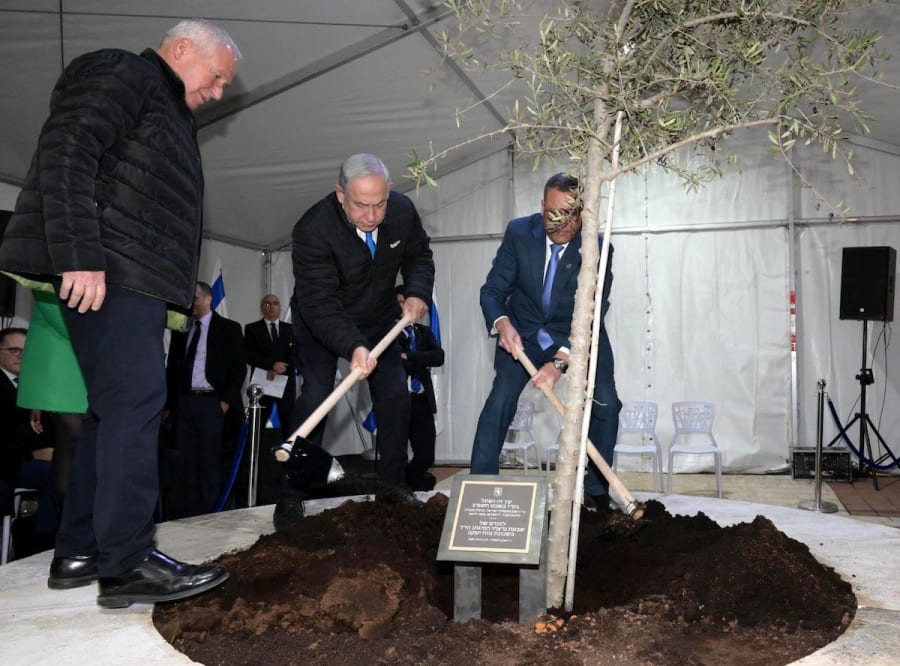Israelis celebrate ‘New Year of the Trees’ by planting
Since 1901, the Jewish National Fund has planted more than 250 million trees all over the land of Israel

Once a year, Israelis celebrate Tu B’Shvat, the Jewish holiday of trees and plants, by planting their own tree.
Since 1901, the Jewish National Fund has planted more than 250 million trees all over the land of Israel as part of a forestation project that has turned the once desert-covered land green.
Each year, JNF plants various types of trees suited to the arid climate and region, among them, olive trees, pines and date palms.
The Israeli government, which determines where and how many trees to plant, oversees the nation’s forestation project, which has ranked Israel among very few countries that are greener today than they were a century ago. On Tu B’Shvat, Israeli children, students, families and volunteers all get to take part in the initiative by planting their own trees.
In the 1960s, Israel planted the Yatir Forest in the Negev Desert in southern Israel. Despite predictions from pundits that the project was doomed to fail because of the harsh climate, the forest grew to be the largest one in the Jewish state.
Israel’s forestation project has two main goals, according to the Jewish National Fund. The first is environmental, which has a social component that pertains to Israelis’ quality of life.
“As we all know, trees and greenery are great for the environment. They produce oxygen and are good to cool the climate, but in Israel, they have another importance because they’re rolling back the desert,” said Talia Tzour, chief-of-staff for JNF-USA in Israel.
“It’s good for the greenery of Israel. Most Israelis live in condominiums and not in houses, and these trees and forests become the parks that most Israelis go to for picnics, barbecues, etcetera. These are the areas. So it’s good for the climate, good for the quality of life,” Tzour said.
The second goal is more ideological.
“During the time of the British Mandate, we had to prove our ownership of the land and to cultivate it. The easiest way to do that was to plant trees around Israel. So that’s how it all started, with the tree-planting to prove our ownership,” Tzour said.
However, according to Shay Rabineau, associate director of the Center for Israel Studies at Binghamton University in New York, Tu B’Shvat is primarily a holiday centered around Israelis’ love of nature.
“When Israel’s environmental movement was born in the early 1960s, it organized hikes on Tu Bishvat to raise public awareness of ecologically sensitive areas and to protest state plans for large-scale construction there. Participants viewed hiking not merely as a recreational activity, but as a means of raising environmental awareness,” Rabineau wrote in Times of Israel.
During the holiday, thousands of Israelis will visit the country’s hiking trails to connect with nature and, perhaps, also to appreciate the slower pace that is generally connected with spending time in nature.
“We see that natural processes are slow and hidden, that development happens beneath the surface,” Israeli journalist Sivan Rahav-Meir wrote. “We do not see immediate results, but still need to care for what we plant and to strengthen our resolve to be patient. In an era when we wait impatiently for two blue checks next to our WhatsApp message, we are reminded once a year of the things we need most: patience, persistent effort, devotion. All of these, in the end, bring the longed for results and wonderful fruits.”
Despite its tiny size, the Jewish state’s advanced agriculture technologies have made it a role model for countries with arid climates and insufficient water. Israel has become a workshop for technologies that address arid climate challenges, from California and Africa to the Middle East and Australia.
Israel’s water and green technologies have also become valuable tools for advancing diplomatic relations worldwide.
In May 2022, Israel signed a deal to export agriculture technology to Azerbaijan. The overwhelmingly Muslim country has become a close political partner for Jerusalem because of its geographic proximity to Iran, a country that threatens both Israel and Azerbaijan.

The All Israel News Staff is a team of journalists in Israel.














